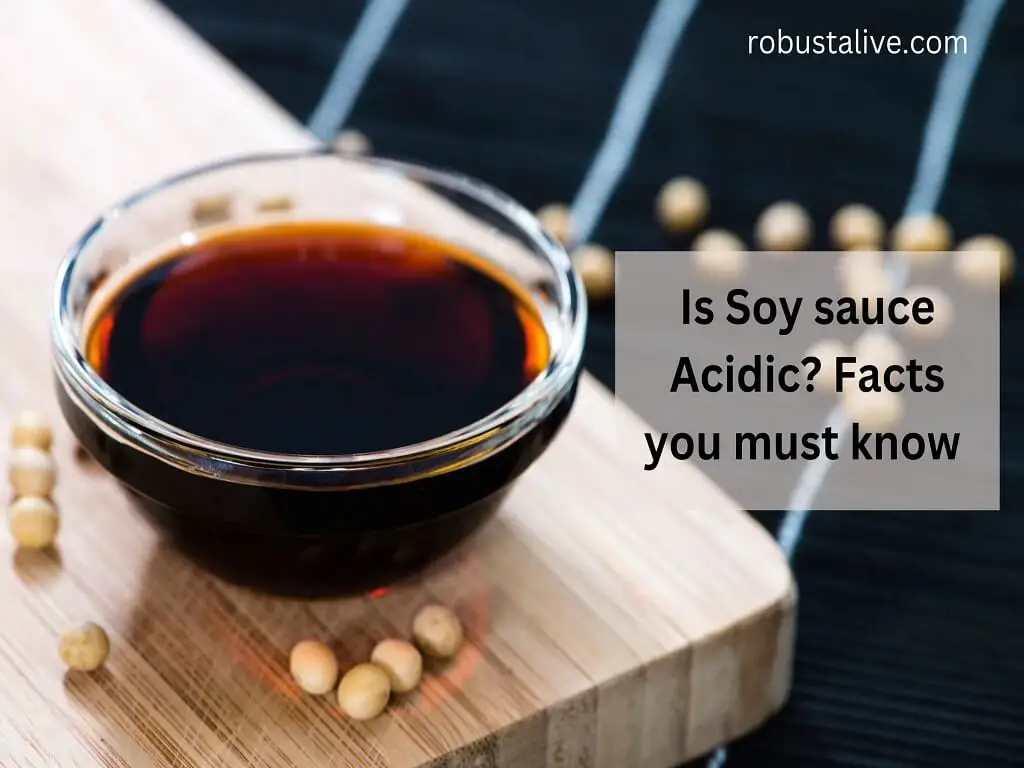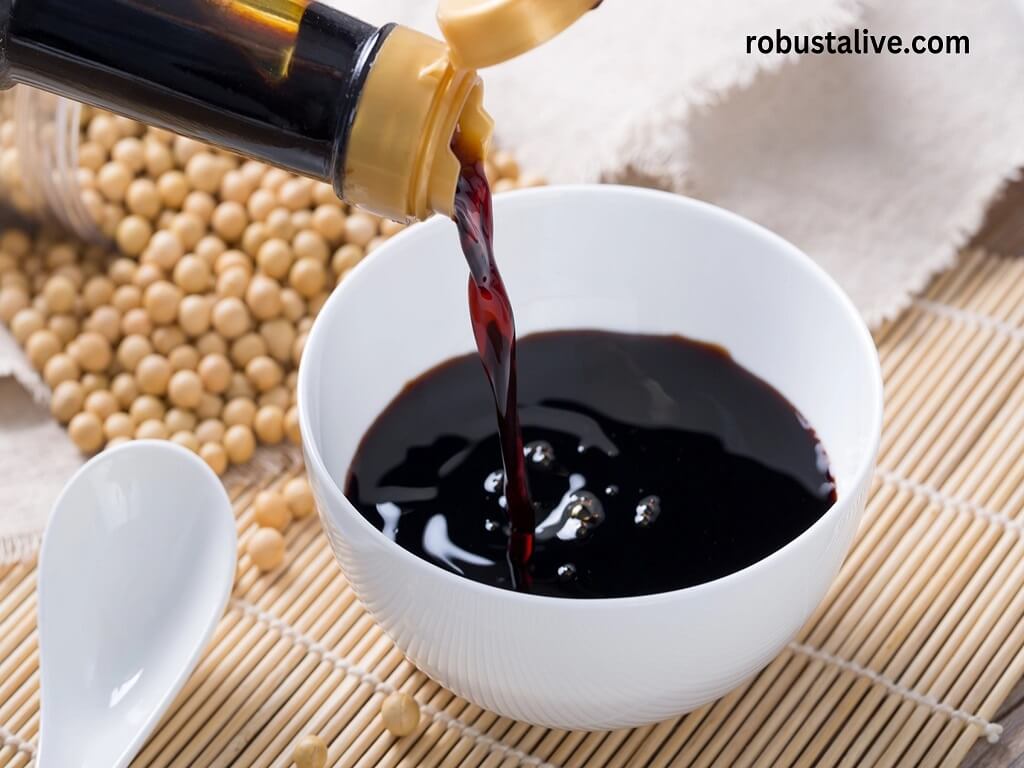Is Soy Sauce Acidic? Facts You Must Know

Are you wondering if is soy sauce acidic or basic? The answer is a little surprising; Soya sauce is quite acidic. But don’t let it stop you from adding it to your dishes. Due to its distinct flavor and unique aroma, soy sauce is popular among fitness and food lovers.
Usually, the pH of soy sauce is about 4.5-6.5, which makes it slightly less acidic. But the good news is that this acidity level is safe for consumption and doesn’t hurt your stomach and teeth.
So next time, you can enjoy soy sauce without thinking either soy sauce is acidic or basic. Make sure to take the appropriate amount when preparing your meal.
What makes soy sauce acidic?
It is made up of fermented soybeans, and like other fermented dishes, it has lactic acid behind its acidity and signature taste. Other common ingredients are koji (bacterial culture to help ferment), wheat, water, and salt for brine.
Soy sauce has about 1.0% lactic acid and contains a trace of other acids like malic acid, acetic acid, tartaric acid, and oxalic acid.
The pH of Soy Sauce

Photo Credit: robustalive.com
The soy sauce’s exact pH level depends on many things, like its production and brand. But generally, it’s approximately 5. The pH range is measured between 0 and 14, and anything lower than 7 is considered acidic.
If you aren’t sure about the acidity of the brand you are using, then take a pH strip and quickly test the acidity level of your bottle at home.
Soy Sauce Production
Traditional production
Traditional soy sauce is prepared with broken and roasted wheat and water-soaked soybeans. The broken wheat and soaked soybean are mixed using a culture mold, especially Aspergillus, and develop for three days. After it, this combination is fermented for 6 to 8 months. Some varieties can take a longer time.
During fermentation, the enzymes and the mold operate on the wheat and soy protein and slowly break it down into amino acids. After its conversion to simple sugars, the alcohol and lactic acid are produced by the fermentation of starch.
After the fermentation and aging, the mixture is spread and pressed on a cloth to release the fluid. Then the liquid is pasteurized to kill the remaining bacteria, and it’s bottled.
Chemical Production
Chemical processes allow for faster and less expensive soy sauce production. This production process, known as acid hydrolysis, could produce soy sauce in days instead of months. This process involves heating soybeans to 176°F (80°C) and mixing them with hydrochloric acid. The proteins in wheat and soybeans are also broken down during this process.
This method is quick and cheap, but the soy sauce it produces tastes normal, contains certain dangerous ingredients, and can require the addition of more spices and colors.
Also read: Is peanut butter acidic or basic?
How Acidic Is Cooked Soy Sauce?
Even when using soy sauce, you can lower food acidity by cooking it with a tiny bit of baking soda. To prevent the baking soda flavor from overpowering the meal, taste the food as you add baking soda to lessen the sour flavor.
Even if you add soy sauce at the end of cooking, it won’t always become more or less acidic.
Is There Any Nutritional Value in Soy Sauce?
Most meals, including stir-fries, marinades, and dipping sauces, include this amazing sauce as a necessary component. So, is there any nutritional value to soy sauce? In addition to having some sodium and protein, it has comparatively few calories and fat.
Soy sauce is not exactly a healthy food but it is also high in sugar and chemicals. However, it is unlikely to cause any harm if you appreciate the taste of soy sauce and use it sparingly.
Soy sauce has eight calories and one gram of protein per tablespoon. Small levels of calcium and potassium are also present. However, a tablespoon of soy sauce contains more than 1000 mg of sodium, making it exceptionally high in sodium. It goes to around one-third of the sodium consumption that is appropriate.
Soy sauce is not a wise choice for those attempting to reduce their sodium intake. Soy sauce is best utilized as a flavoring agent rather than a source of nutrients because it generally has little nutritional value.
Is Soy Sauce bad for GERD (Acid Reflux)?
There is no clear-cut yes or no to the question. It would be best for you to avoid it if you already have symptoms to prevent your situation from worsening.
You need to control your soy sauce consumption threshold regardless of how your stomach is feeling at the time. However, it may not bother you, depending on the day. Consult a medical expert if you have any questions about consuming soy sauce.
What’s the best replacement for Soy sauce?
A well-liked soy-free, gluten-free, and vegan alternative to soy sauce is the amino sauce produced by Coconut Secret. This sauce is derived from the sap of coconut palms and is made with Gran Moluccas sea salt from the Philippines.
It has much less salt than soy sauce and other substitutes only 90 mg per serving. The sauce also contains 17 amino acids, which increases the soy sauce’s health benefits. Coconut aminos’ price and accessibility are drawbacks. Some claim that the flavor and aftertaste are sweeter when compared to soy sauce.
Conclusion
Generally, soy sauce is typical in spicy dishes but is also commonly used to add flavor and saltiness. The sauce is acidic, with a pH of 4.8. If you have a healthy digestive system, then the sauce is perfect. But in case you have GERD, you should avoid using it. In soy sauce, histamine is the primary component that upsets the stomach.
The pH of the food has a direct impact on the individual digestive system. So try to keep the intake at an average level so that it doesn’t affect your stomach or cause any other serious health complications. However, in case of acidity, focus on healthy things like oatmeal, hummus, broccoli, dates, cucumber, e.t.c.
Frequently Asked Questions (FAQs) about Is Soy Sauce Acidic?
Is Kikkoman Soy Sauce Acidic?
Kikkoman is a famous Japanese sauce that is naturally brewed. The 4.8 pH shows that it’s acidic. Besides, this sauce is high in sodium, so you must limit the salty foods.
Is Tamari Soy Sauce Acidic Or Alkaline?
Tamari soy sauce is usually less acidic, becomes alkaline after digestion, and has a pH of about 7.5. This sauce benefits digestion and is high in nutrition, but it’s not beneficial if you have an acidity problem.
Is Dark Soy Sauce Acidic?
Dark soy sauce is generally mixed with corn starch and caramel, which makes the sauce darker. As compared to regular soy sauce, it is sweeter.
References
https://www.foodchamps.org/is-soy-sauce-acidic/
https://trishdeseine.com/is-soy-sauce-okay-for-acid-reflux/
https://emozzy.com/is-soy-sauce-acidic/
https://healhealth.in/is-soy-sauce-acidic.html
https://www.knowyourpantry.com/sauces/is-soy-sauce-and-acid/
https://tinykitchendivas.com/is-soy-sauce-acidic-you-mights-be-surprised/





